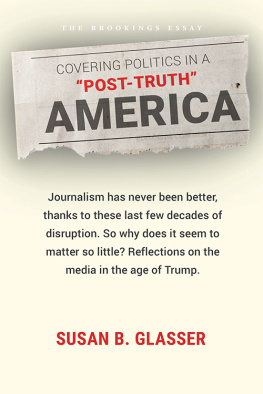William Glasser - The Control Theory Manager
Here you can read online William Glasser - The Control Theory Manager full text of the book (entire story) in english for free. Download pdf and epub, get meaning, cover and reviews about this ebook. year: 2010, publisher: HarperCollins, genre: Politics. Description of the work, (preface) as well as reviews are available. Best literature library LitArk.com created for fans of good reading and offers a wide selection of genres:
Romance novel
Science fiction
Adventure
Detective
Science
History
Home and family
Prose
Art
Politics
Computer
Non-fiction
Religion
Business
Children
Humor
Choose a favorite category and find really read worthwhile books. Enjoy immersion in the world of imagination, feel the emotions of the characters or learn something new for yourself, make an fascinating discovery.

- Book:The Control Theory Manager
- Author:
- Publisher:HarperCollins
- Genre:
- Year:2010
- Rating:5 / 5
- Favourites:Add to favourites
- Your mark:
- 100
- 1
- 2
- 3
- 4
- 5
The Control Theory Manager: summary, description and annotation
We offer to read an annotation, description, summary or preface (depends on what the author of the book "The Control Theory Manager" wrote himself). If you haven't found the necessary information about the book — write in the comments, we will try to find it.
The Control Theory Manager — read online for free the complete book (whole text) full work
Below is the text of the book, divided by pages. System saving the place of the last page read, allows you to conveniently read the book "The Control Theory Manager" online for free, without having to search again every time where you left off. Put a bookmark, and you can go to the page where you finished reading at any time.
Font size:
Interval:
Bookmark:
THE
CONTROL THEORY
MANAGER

Combining the Control Theory of
William Glasser with the Wisdom
of W. Edwards Deming to Explain
Both What Quality Is and What
Lead-Managers Do to Achieve It
William Glasser, M.D.

To Naomi, my wife of forty-six years and the editor of my last six books, who died after a short bout with cancer in December of 1992. This is the first book in recent years that she had no part in editing but, as her imprint is on me, it is very much on this book. She was a good person, all who knew her loved her. Can more be said of anyone?
As this book is being written at the beginning of the Clinton administration, there are many positive economic signs being reported in the newspapers and on television. The stock market is at an all-time high and inflation seems well under control. All of this might indicate that my argument that we must move much faster and more completely to quality products and services may be overstated.
This, however, is not the case. Too many well-paid people are still being laid off. And what is far more significant is that the number of people employed by the private sector has also dropped significantly over the past ten years. Further, the government is drowning in red ink and only more good jobs in the private sector will stop this drain.
While the deficit seems to be an economic mystery and reputable economists say we need not worry about it, I dont think this argument will convince many people if taxes start going up and government cutbacks start to affect COLAs, health care, and jobs. For example, todays paper (Los Angeles Times, February 4, 1993) talked about shrinking the armed forces by 270,000 people who the economy will have to absorb or the government support. Many of these people will be minority members of our society who, although educated and skilled, will not easily find comparable jobs in their communities. This move has the potential to increase the unrest in the already restless centers of our large cities. And unrest is expensive.
From experience we can predict that, barring an economic catastrophe, spending will be hard to cut and taxes will be hard to raise. The only long-term solution is more people working in the private sector who, along with their employers, pay more taxes. To achieve this, we have to buy the products we make, not because we have raised tariffs to an exclusionary level but because our products are as good or better than those made elsewhere. I argue that only much better management of people will make this possible. If we look at our successful companies, we will find that they have taken managing for quality very seriously. In doing this, they have discovered that they must focus on the workplace far more than on the work. While what they have done should be a beacon for all companiesas Japan was a beacon for many of themso far it has not worked this way. This is because, without the control theory explained in this book, most managers find it almost impossible to conceptualize a quality workplace. As long as we lack this vision, we will never achieve the level of quality we must achieve if we are to be competitive in an increasingly competitive world.
Managing for Quality
The Reason for This Book
Based on their common sense, almost all American managers are so convinced that they know why the people they manage behave the way they do that it never occurs to them that they could be wrong. This is why so many of them are puzzled. Managing workers with what they haveknown all their lives is not leading to the quality work they know their companies need to achieve to be competitive. That many companies are tailing to achieve quality is painfully apparent. Their previous customers are buying what they believe are better foreign products, most of them made in Japan. More than any other reason, these products are better because foreign workers, especially Japanese workers, are managed much more effectively than we manage ours.
Led by Deming,system that has always produced a lot of work and was quite competitive as long as everyone used it and no ones products were significantly better than anyone elses. In the next three chapters, I will describe both systems in detail.
But managers need more than a description: they need a clear understanding of why lead-management produces quality and boss-management does not. Control theory, a new explanation of how we behave, supplies that understanding, and in this book I will strongly recommend that all managers learn to use this theory. Workers who are managed by people who use control theory will consistently do quality work at a competitive cost. Part Two of this book will be devoted to a detailed explanation of this new theory.
It is only fair to warn readers that control theory is neither easy to accept nor to learn because we have to give up the common sense, stimulus-response (S-R), carrot-and-stick psychology that most of us have been using all our lives. We cling to this ancient psychology-even though some of its flaws are fairly obvious because, until the very recent introduction of control theory, there was nothing to replace it.
Control theory, in a form that is understandable and usable, has only been around since the early 1980s. Still. its acceptance is growing rapidly and my experience, as one of the leaders in teaching this theory, is that people who read what I write with an open mind find it to be so sensible and usable that many of them are already trying to give up bossing and start leading.
I also believe that the present stubborn, economic recession is a result of the significant improvement in the quality of the products that the Japanese, and others who have learned from Deming, have made available to consumers. After using these products for more than twenty years, almost everyone now wantsand even demandsquality; huge numbers of people have decided that it is not available in many domestic proucts.
This is new. Prior to what Japan has accomplished in the past quarter century, only the wealthy had access to quality products. The middle class, who make up the bulk of the worlds consumers, could only see them in movies or glimpse them when the wealthy drove by. Now they can own them and the desire to accept nothing less has become contagious. In search of quality, billions of our dollars go overseas. Quality has now escaped from Pandoras box; shoddy is disappearing all over the world.
To achieve quality, lead-managers, using the concepts of control theory, embrace the following two procedures that rarely ever occur to boss-managers:
1. Learn what quality actually is, teach it to all who work in the organization, and then listen carefully to any worker who has an idea of how it may be further improved.
2. Manage everyone in the organization so that it is obvious to all workers that it is to their benefit to settle for nothing less than quality work.
This book focuses on managing people. It does not deal with nonhuman issues such as statistics, flow charts. finances or high technology. While these procedures are obviously essential to managing a successful business, companies are not failing because they lack this technical knowledge: their failure is with people. We seem unable to learn that workers will not do high-quality work much more because of the way boss-managers treat them than because they do not understand the technical or statistical aspects of what they are asked to do.
Font size:
Interval:
Bookmark:
Similar books «The Control Theory Manager»
Look at similar books to The Control Theory Manager. We have selected literature similar in name and meaning in the hope of providing readers with more options to find new, interesting, not yet read works.
Discussion, reviews of the book The Control Theory Manager and just readers' own opinions. Leave your comments, write what you think about the work, its meaning or the main characters. Specify what exactly you liked and what you didn't like, and why you think so.





